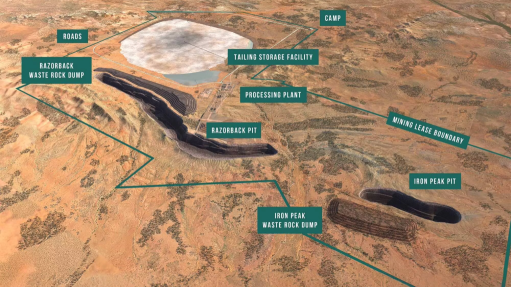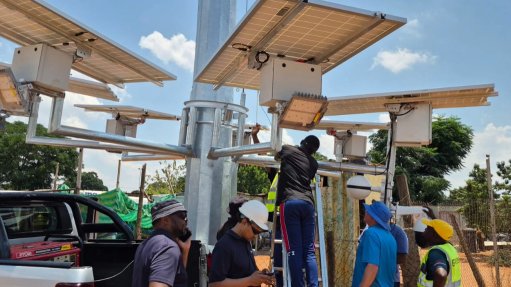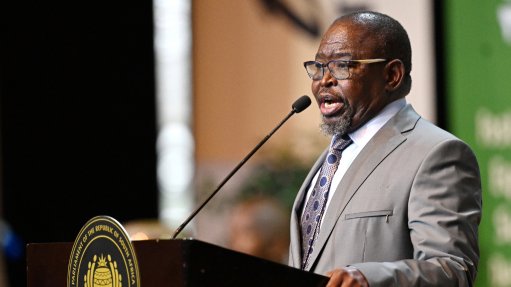Budget speech delay indicative of a ‘robust democracy’ – economist

Econometrix chief economist and director Dr Azar Jammine outlines the impact of the budget speech delay, and the construction sector’s outlook in the prevailing economic conditions
The unprecedented delay in South Africa’s Budget speech this week reflects several positives for the country and, if the country is able to leverage infrastructure spending and tackle structural challenges, it has the potential to improve on the modest economic growth prospects over the next two years.
This was noted by economic consultancy Econometrix chief economist and director Dr Azar Jammine during construction materials provider AfriSam’s yearly budget breakfast on February 21.
The Budget speech was postponed to March 12 owing to a lack of consensus on the proposal to implement a two-percentage-point VAT increase, to cover expenditure and debt.
Therefore, Jammine was unable to provide his usual comprehensive breakdown of the Budget, and instead, elucidated on the economy and budgetary events in the context of the construction sector.
He averred that the delay showed that South Africa’s Government of National Unity (GNU) was working as intended, with all participating political parties able to give their input and conveying to the African National Congress (ANC) that it must consult all of these.
Moreover, Jammine pointed out that, while this was the first time such an event has occurred in the country’s democracy, there were global instances of this occurring and Budget impasses were common in coalition governments.
Therefore, the delay is a reflection of a robust democracy at work, he said.
He explained that the problem came about from attempts to ensure “fiscal austerity”, rather than populism, which could be well received by credit rating agencies.
Also, the disagreement assisted in recognising the dilemma of overspending, Jammine noted.
He pointed out that the proposed increase in VAT would have withdrawn R50-billion from consumers.
However, the delay is not all positive, with negatives including the perception that the ANC only consulted the GNU partners at a late stage.
Moreover, it also presents the challenge of finding alternative revenue sources, which Jammine, as well as his co-presenter, political and economic analyst and strategist Dr Frans Cronje, concurred would be difficult.
Jammine elaborated that other VAT exclusions in the Budget, and no fuel levy increase, would have hampered the two percentage point increased.
He said the challenge was an inability to control spending. Jammine cited examples as including the public sector wage budget increasing by R23.4-billion over three years; the Social Relief of Distress Grant being retained for another year; and the Child Support Grant, among others, increasing by above-inflation rates.
As alluded to, National Treasury was still relatively bullish about economic growth prospects, projecting a 1.8% increase in GDP this year and 1.9% in 2026, and Jammine added that this had the potential to be improved if issues such as infrastructure and crime were mitigated.
However, Jammine pointed out that this was a only modest growth, from the low 0.7% seen last year, and not sufficient enough for the country.
He emphasised that sustainable growth would only come when this higher growth was realised.
Jammine highlighted tackling structural impediments as crucial for the long term.
He also noted the importance of following through on infrastructure commitments, with a disconnect between what was announced and projects that were actually implemented.
Jammine highlighted several infrastructure intentions in the Budget speech, including capital payments, that is, money allocated for the purchase or upgrade of long-term assets like buildings, machinery and equipment.
Over the next three years, public infrastructure spending would reach over R1-trillion, with R402-billion for transport and logistics, R219-billion for energy infrastructure and R156-billion for water and sanitation.
The South African National Roads Agency is looking to spend R100-billion over the medium term, with considerable resurfacing, improvements and resealing in the offing.
Roads kept in active resurfacing contracts went from 950 km in 2024/25 to 2 000 km in 2025/26.
A credit guarantee vehicle is also set to be launched in the first half of 2026.
Cronje added that there was no alternative to the VAT increase on the revenue side, as revenue’s share of the economy had already reached a point far beyond that of diminishing return.
“Any future increases in government revenue sucks money out of the economy and weakens economic performance.”
Article Enquiry
Email Article
Save Article
Feedback
To advertise email advertising@creamermedia.co.za or click here
Press Office
Announcements
What's On
Subscribe to improve your user experience...
Option 1 (equivalent of R125 a month):
Receive a weekly copy of Creamer Media's Engineering News & Mining Weekly magazine
(print copy for those in South Africa and e-magazine for those outside of South Africa)
Receive daily email newsletters
Access to full search results
Access archive of magazine back copies
Access to Projects in Progress
Access to ONE Research Report of your choice in PDF format
Option 2 (equivalent of R375 a month):
All benefits from Option 1
PLUS
Access to Creamer Media's Research Channel Africa for ALL Research Reports, in PDF format, on various industrial and mining sectors
including Electricity; Water; Energy Transition; Hydrogen; Roads, Rail and Ports; Coal; Gold; Platinum; Battery Metals; etc.
Already a subscriber?
Forgotten your password?
Receive weekly copy of Creamer Media's Engineering News & Mining Weekly magazine (print copy for those in South Africa and e-magazine for those outside of South Africa)
➕
Recieve daily email newsletters
➕
Access to full search results
➕
Access archive of magazine back copies
➕
Access to Projects in Progress
➕
Access to ONE Research Report of your choice in PDF format
RESEARCH CHANNEL AFRICA
R4500 (equivalent of R375 a month)
SUBSCRIBEAll benefits from Option 1
➕
Access to Creamer Media's Research Channel Africa for ALL Research Reports on various industrial and mining sectors, in PDF format, including on:
Electricity
➕
Water
➕
Energy Transition
➕
Hydrogen
➕
Roads, Rail and Ports
➕
Coal
➕
Gold
➕
Platinum
➕
Battery Metals
➕
etc.
Receive all benefits from Option 1 or Option 2 delivered to numerous people at your company
➕
Multiple User names and Passwords for simultaneous log-ins
➕
Intranet integration access to all in your organisation


















